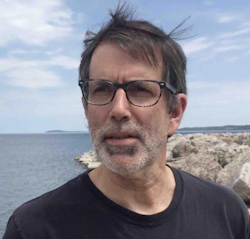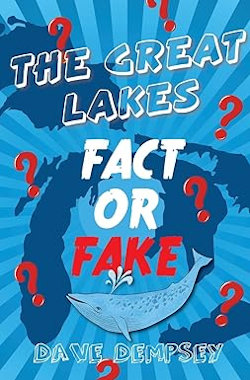SEJournal Online is the digital news magazine of the Society of Environmental Journalists. Learn more about SEJournal Online, including submission, subscription and advertising information.
 |
 |
| A view of the Great Lakes from space. Photo: U.S. Environmental Protection Agency, via Flickr, U.S. Government work. |
BookShelf: Between the Lines — Great Lakes Author Looks Back on a Writing Career, Forward to Journalism’s Future
Michigan’s Dave Dempsey planned to become an academic and novelist. But then he encountered the environmental policy field and instead went on to become the author of twelve books on the environment, and an adviser and activist. Now, he says his recently released book is his last on the topic. SEJournal contributor Gary Wilson recently spoke with Dempsey about his writing, his varied career, his perspective on the state of environmental journalism and his advice for emerging journalists.
 |
| Photo: Dave Dempsey via Gary Wilson. |
SEJournal: Early in your professional career, in the mid-1980s, you were an environmental policy adviser to a Michigan governor. What prompted you to eventually add a second career track as a writer? Was there a moment when you said, “I need to write,” or did your interest in writing evolve?
Dave Dempsey: It evolved. I grew up wanting to be a novelist and I loved writing and literature. I had a vision of being a college professor and writing the great American novel, but that didn’t pan out. Mainly because I got into environmental policy before I got into graduate school. So I basically combined the two interests. The initial stab at writing was inspired by the stories of various old-timers about what they called the good old days in Michigan’s environmental policy. Once I did some research, I was very interested in the history of Michigan’s conservation and environmental protection. It was a great motivator to put that in writing. No one had done it previously.
SEJournal: You’re in a unique position given that in your career you’ve been a policy adviser, plus an activist and author — all centered on the environment. How did that back-and-forth affect your writing? How did you maintain objectivity?
Dempsey: In a couple of ways. People have asked me how I could write objectively about events in which I’ve been involved. It’s only a small fraction of what I’ve written, but it’s not that hard. I’m not egotistical and I wouldn’t say my involvement in any of these issues has been particularly instrumental in outcomes. If there were issues that I felt I was unable to address objectively, I left them out. When in doubt, leave it out. And I always try to credit the other point of view with having some merit.
SEJournal: Your first book in 2001, “Ruin and Recovery: Michigan’s Rise as a Conservation Leader,” chronicled how the state went from the depths of environmental degradation to, as you said, being a leading state on conservation. What motivated you?
Dempsey: It’s a great story for one thing. It’s a cyclical story on the human relationship to the environment — from believing that our resources are infinite and inexhaustible to seeing them crash, then rebound to a robust recovery followed by another crash. I find that fascinating. It’s part of a larger history that involves, basically, changing attitudes, values and policies in the United States. I was caught up in it because of my policy work. It helped me understand what I was doing and where I wanted to go with my career.
‘I felt at a crossroads in my career.
I felt despair related to things getting better.
Then I looked back and saw there was hope.’
But spiritually, the reason I wrote “Ruin and Recovery” then is because I felt at a crossroads in my career. I felt despair related to things getting better. Then I looked back and saw there was hope because back in the 1800s, before environmentalism was a value, there were people with much longer odds than activists today face and they managed to change things. In the 1870s there were wildlife advocates who were ultimately successful in getting the state to change policy. That provided inspiration to move forward in my career.
SEJournal: You’re best known for your writing on the Great Lakes beginning with “On the Brink: The Great Lakes in the 21st Century” in 2004. Since then, the lakes have begun a long, slow restoration process. The United States and Canada formed an alliance to minimize the risk that Great Lakes water will be shipped to arid regions, but they are feeling the effects of climate change. That’s a lot. How best does an author or journalist approach the magnitude of those challenges, be they the Great Lakes, the Colorado River crisis or California's drought and flood cycle?
Dempsey: It’s important to pick a subset of the issues, maybe a geographic subset that’s manageable. I couldn’t write a book about the national environmental cycles over the last 20 years let alone the last 200 years. Pick a small story that tells the larger story. For example, instead of doing a nationwide tome on water, I looked at the arid Southwest and the Great Lakes to see the lessons that can be learned from each. That became two editions of “Great Lakes for Sale.”
SEJournal: There can be a tendency for young journalists to think that when they started reporting it was the beginning of time, to not consider what came previously on an issue. What’s your advice to emerging journalists on dealing with the history of an issue?
Dempsey: Do the research. Part of the reason for almost any book I’ve written was to dig into the archives and interview as many of the survivors of the old era as I could find. Try to see what the differences and similarities are. Again, I felt inspired by the lonely voices of the 1800s who were speaking up against the ruin of the forests. There’s no substitute for doing the research and doing the work to see if you can identify trends and both positive and negative correlations between your subject matter and the larger groups.
 |
| Dempsey’s latest — and possibly last book. |
SEJournal: Your most recent book, “The Great Lakes: Fact or Fake?” eschews the big policy issues and is designed to engage a general audience. Do environmental writers need to do more of that? Are accomplished authors too focused on policy at the expense of connecting with a broader audience? Or should they do both?
Dempsey: I don’t want to critique other writers who are doing good work but for me, at this point, the issue is we’re generating work on policy ideas but the public isn’t there. They're not into the nitty-gritty of wonkism. They want clean water but they don’t have a sense of the political investment that has to be made. Audiences are busy people with competing demands for their time so I decided with “Fact or Fake” to step back and make it more fun and less policy-oriented, in fact, not policy-oriented at all. My perception is that the audience for deep policy books is very limited.
SEJournal: You recently said your most recent book is your last on environmental issues. You’ll be focused on non-environmental biographies. Why the shift in focus?
Dempsey: I’ve said most of what I have to say. I‘m not ruling out another environmental book but I don’t see any subject on which I have anything to offer that I’ve not already said. It’s time for others to pick up the subject and do what they can with it.
SEJournal: Any regrets? An environmental book that went unwritten?
Dempsey: I’m sure there are many. I’d like to have done a biography on Indiana’s Lee Botts, a seminal figure in the Great Lakes environmental movement. Partly because she was from Oklahoma and brought an interesting perspective to Great Lakes issues. Maybe a book about the personal impact of disasters like PBB and others on individuals to make that story more tangible to people. I admit there are a couple of books I’d like to go back and change but I’m not likely to do that.
SEJournal: What’s your advice to early-career journalists or budding authors? How can they prepare for a, hopefully, 30-year career?
‘Is it best to invest in a book
few people would read?
Or better to create a website
with engaging short stories and factoids?’
Dempsey: I can tell a story about myself to respond to your question. I was recently contacted by a watershed group to write a book about the recovery of their watershed and the assignment would pay well. I told them it was not a good investment of their time and money. Is it best to invest in a book few people would read? Or better to create a website with engaging short stories and factoids, things like that? And I strongly recommend that emerging journalists take good notes. There may be things happening in your life as a journalist that will be useful later.
SEJournal: Final thoughts for environmental journalists?
Dempsey: I see too much of a tendency of the environmental media to take handouts, as opposed to doing their own research. Part of it is because of the lack of staff but there’s also some laziness. We need to have more aggressive investigations in the environmental reporting movement. There are all kinds of behind-the-scenes maneuvering and sometimes scandals that go unreported. Adversarial journalism is not a bad thing.
* From the weekly news magazine SEJournal Online, Vol. 8, No. 34. Content from each new issue of SEJournal Online is available to the public via the SEJournal Online main page. Subscribe to the e-newsletter here. And see past issues of the SEJournal archived here.













 Advertisement
Advertisement 



